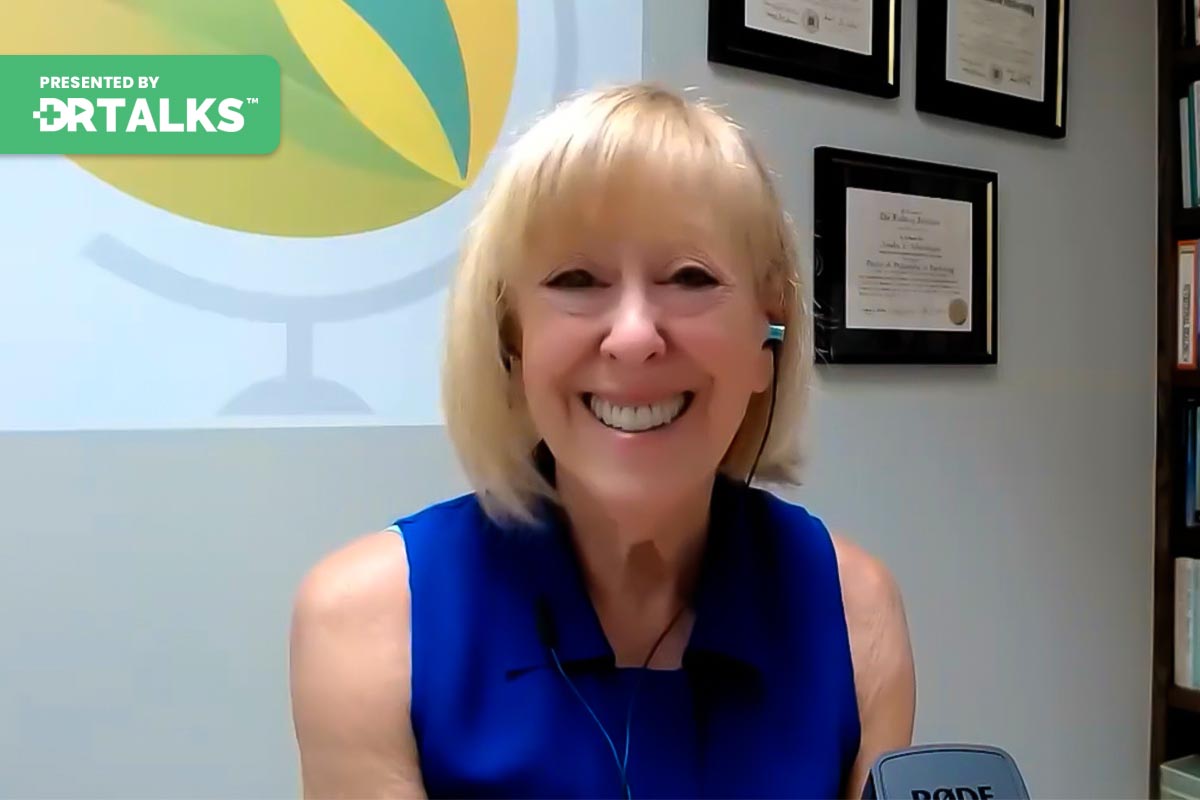And I want to share all of that with you so you can take charge of your own health. As I did all of these amazing interviews it really struck me that I’m interviewing these amazing people but I am not able, during these interviews, to express all of my thoughts and all of my approaches. So I said to myself, I need to create a course so that you can hear my voice, so that you can know what I would do for all of these things. Kind of like put it all together. Explain what I see in patients with PCOS as the underlying health issues. Explain it from a scientific point of view, and then provide actionable therapeutic approaches that you can do many times on your own or you can then take checklists to your physician and say, Please, could you consider ordering the following tests or consider such and such. So that’s what I want to do for you. So I’m covering it all in this course. I’ve never created a course like this before. I’ve done so many lectures on PCOS but I’ve never had something like a very organized six-module course that really does a deep dive into all of the key issues of PCOS. I’m very excited to be putting this together and then sharing it with you.
For this little talk that I’m giving to you right now, I want to share some of my thoughts on a very important issue for so many women with PCOS. And even if this is not in your wheelhouse right now, maybe it will be in the future, or maybe it’s not anything you’re interested in. What I can tell you is the information I’m going to impart to you is going to add a great deal of value to even if fertility is not on your radar right now. Because PCOS is the number one cause of female infertility. And if you are infertile, and it’s not like you had your tubes tied, so it’s a natural source of infertility as a woman. It’s really a sign that there is something significantly wrong. That’s why the information that I’m going to impart on how to become more fertile is important for women who don’t even seek fertility in terms of having a baby. Because fertility is a sign of health. Even ancient peoples knew this and they would worship gods of fertility. Fertility means that you’re healthy. And so even if you don’t want to have a baby, you want to be healthy. So all the tips that I share about how to become more fertile are really applicable to every woman with PCOS who simply wants to become healthier. So I’m going to talk about menstrual cycles, the egg quality. Because number one, you don’t want to just ovulate an egg, you want to have a high-quality egg, and then you want to make sure that everything goes right if the egg becomes fertilized that it can actually implant. And not just implant, but thrive. Because women with PCOS have significant increased incidence of what, miscarriages.
So this is not an insignificant thing. Because you could work so hard and strive and then you even go through assisted reproductive technology. Like you have intrauterine insemination, you have triggered ovulation with fertility drugs, you have even IVF, in vitro fertilization. And then you finally conceive and then you lose it because you miscarry. That’s all part of fertility. So recurrent miscarriages or pregnancy loss is so emotionally devastating. I don’t want anyone to have to experience these things. So in my module on optimizing fertility, I’m going to deal with all of the issues that underlie infertility in women with PCOS and what you can do as a PCOS woman to improve your fertility, whether you want to have a baby or not. Because like I said, being fertile is about being healthy. Now age matters for fertility, every woman knows that. So it’s important to always understand that fertility for women declines with age. And women are most fertile in their early twenties. So everyone out there who has PCOS, please note that this old dogma of women with PCOS have longer fertility lives.
They become more fertile as they get older. Hogwash. Okay. They used to say, and by used to, I mean, like a year or two ago, I mean, like really recently they were saying that menopause is not an issue for women with PCOS. Nothing changes. You know, when a woman goes from PCOS reproductive lifespan into menopausal time that they no longer have PCOS, that’s what they were saying. And that’s not true. Okay. You have the metabolic issues of PCOS even when you’re in menopause. And it accelerates aging and cardiovascular events. PCOS is lifelong. And those out there who are saying, and this is like very commonly said but it’s false, that women with PCOS have longer ovarian lives and they become more fertile as they age. Please note that it is not true. Women with PCOS have inflamed everything, including inflamed ovaries. And inflammation causes damage and degradation to eggs. Inflammation is not healthy and they’ve even done studies where they take fluid from around the follicles that hold the eggs. Okay. The fluid around the eggs in women with PCOS. And what do they find? Inflammatory cells. There’s inflammation surrounding the eggs in the ovaries of women with PCOS. This is not an environment that promotes longevity of fertility or enhance fertility. So please know that there’s a lot of misinformation being delivered, and this is by people in academia. It’s just really frustrating to see what’s going on out there. Just like for the longest time they kept claiming that PCOS has no meaning once you hit menopause, it sure does. You have accelerated and higher risk for everything bad like heart attacks, hypertension, and strokes. So that’s why we need to take action. Okay. Knowledge is power. Risk is not destiny. That’s a really important takeaway. Just because you have a higher risk doesn’t mean that’s your fate. I’m all about changing destiny by taking positive action.
And I know so many women with PCOS who have come to me in my office and have said I was told I will never be able to have children because I have PCOS. Hogwash again, I have been able to get the majority of my patients with PCOS to achieve pregnancy with no special assistance from any kind of ovulatory drugs that trigger ovulation or IVF or IUI’s, as long as the male partner. That’s another thing. We always have to deal with the man, but not talking about him, taking him out of the equation. I can tell you that the vast majority of my patients succeed in conceiving and successfully conceiving, in other words, they don’t miscarry and they have no complications during their pregnancy. That’s the other thing. Fertility also means not only do you get pregnant and stay pregnant and don’t miscarry but you have an uncomplicated pregnancy. This is really, really important. So important. Now I’m going to share so much knowledge, so much information with you about improving fertility using natural, holistic, integrative approaches, best specifically for women with PCOS in my module on fertility. But I always want to share in these little presentations one helpful takeaway tip on how to improve your fertility right now today.
Well, here’s my little tip. It’s about a gas called nitric oxide. Many of you have never heard of nitric oxide. It’s an antioxidant gas and it’s made in arteries with actually estrogen. Estradiol triggers the production of nitric oxide through an enzyme that’s in artery walls. But also you can make it, I call it the backdoor way to get nitric oxide, this anti-oxidant gas, which really helps women to be more fertile. Okay, nitric oxide. I’m telling you not enough people talk about it. Nitric oxide is key to a healthy vascular system, healthy brain, healthy heart. And you can make more nitric oxide if you eat more nitrate-containing vegetables. These are typically the green leafy. And you can go online right after you hear this and Google high nitrate vegetable. Some of my personal favorites are kale, bok choy, spinach, and my ultimate favorite is beets, the beetroots. And you probably heard beets are kind of trendy, beet juice, but if you have beet juice, here’s another like important tip. You need to hold it and mix it with the saliva in your mouth and you need to chew all of your vegetables., and if it’s in a liquid form hold it and mix it with your saliva. Because how do you change the nitrates in the vegetables into ultimately nitric oxide, which is a gas that diffuses out of your GI tract, your intestinal tract, and then into your arteries and into your ovaries and getting everything optimally healthy. Because you need to have healthy arteries to have a healthy pregnancy. Because arteries are the lifeline involving placental function.
So I’m not going to deal with that right now. It’s too complicated for this minute, but many of the complex patients that women with PCOS suffer in pregnancy are related to nitric oxide deficiency states. Okay. Because of estradiol deficiency. And once again, complex story. But you need to have healthy arteries. Of course, you need to have healthy ovaries, you need to have healthy brain. And all of these are benefited by nitric oxide. So by eating beets and green leafy vegetables, you can, through your GI tract, your intestinal tract, you can make more nitric oxide. But here’s the thing. You need to mix it with saliva. The nitrates in vegetables are turned into nitrites by the action of enzymes that only come from mouth bacteria. Only mouth bacteria. These enzymes are called reductases. The reductases that are produced by the bacteria in the mouth turn the nitrates into nitrites, okay? And nitrites then are going down the GI tract and in the stomach and in downward path, lower than that. The nitrites are converted into nitric oxide and nitric oxide is the gas and it can diffuse out of the intestinal tract and into the body as a whole. Into the arteries, as I mentioned, into the brain, the heart, the ovaries. So you need to eat nitrate vegetables. You need to chew your food and mix it with the saliva so the bacterial action with reductases can turn the nitrates into nitrates. And then you need to have other nutrients like magnesium, and zinc, and B12 to help fuel their processes that can convert nitrates into nitric oxide.
So I know this is complex. You actually don’t have to remember much of anything except that there’s real science to explain this and that it’s really important for you to eat a lot of nitrate containing vegetables. As I said, my favorites are kale, bok choy, spinach, and beets. But there are many others and you can easily Google high nitrate vegetables, you get whole lists, okay? And you will then learn lots and lots about nitric oxide. This is not a little bit of information. This is critical information. I wanted to share with you my helpful tip of the day.











